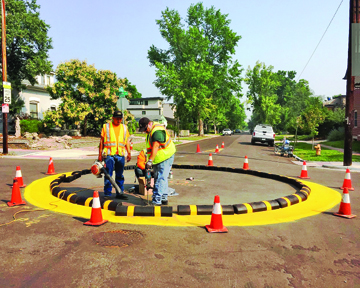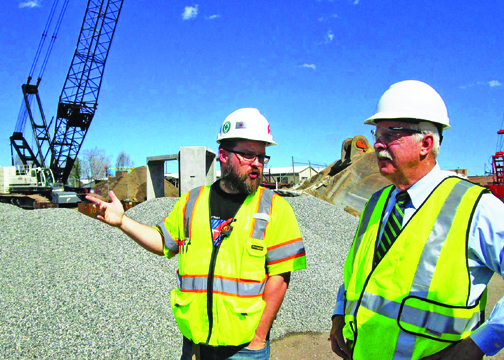Despite $1.46 Billion Budget, City Among 50 Worst; Auditor Cites Pay-To-Play Politics At Public Works, Parks

by Glen Richardson
Albeit city salaries are about $1 billion annually, Denver can no longer crack a spot in America’s 100 best-run cities, falling into the 50 worst-run big cities in the nation, ranked 117.
A study released last month by WalletHub compared America’s 150 biggest cities to determine the best and worst run municipalities, based upon their operating efficiency. The online financial website constructed a “Quality of City Services” score — comprising 37 key performance indicators grouped into six service categories — that was then measured against the city’s total per-capita budget. The website that recently ranked Denver the 13th best city to live in is owned by Washington D.C.-based Evolution Financial Inc.
Among comparable big cities, Las Vegas (46th), Portland (65th), Boston (67th) and Houston (73rd) were ranked in the top 75 best run cities, providing residents with much more bang for their buck. Moreover, Aurora (54th) and Colorado Springs (58th) were significantly better at planning, coordinating and managing than was the City of Denver.

Spending Spree
Numbers have hinted at Denver’s dismal performance since Mayor Michael Hancock first took office in 2011. Rather than a city manager, Denver has a strong mayor, weak city council system. The mayor can approve-veto any council ordinance or resolution and is responsible for the city budget and appointments to city departments. The city now spends nearly $1 billion annually on salaries alone, up from $600 million just eight years ago. The city’s budget has grown each year since 2010. Denver’s $1.46 billion 2019 budget is up 3% from 2018.

The number of municipal employees has grown by more than 20%. General Administration — which includes the mayor’s office and the city attorney — has grown by 48%. Hancock’s 2019 budget calls for hiring another 260 full-time employees spread across 11 cabinet-level departments. Staffing in departments like Community Planning & Development has grown by more than 80% during Hancock’s first two terms.
Even more worrisome, during the May municipal election, the mayor proposed the creation of several new offices, including a Department of Transportation & Infrastructure. That division would replace and significantly expand the out of control Public Works Department.
Political Patronage
Neighborhood dissatisfaction with Denver’s quality of service — a key component in rating America’s best and worst cities — is reflected by the political patronage in appointments made by the Hancock Administration. Too often they have trouble using taxpayers’ funds wisely (if not improperly) or abusing their positions, critics claim.

Hancock named Eulois Clarkley Executive Director of Denver Public Works in November 2017. He oversees 1,300 employees responsible for city road maintenance, trash collection, design-constructions of streets, public buildings plus parking management.
Clarkley’s selection as Public Works Director was made chiefly to create and expand Denver bike lanes. His exceptional job of adding multiple bike lanes has incensed dozens of neighborhoods. The former Deputy Director of the Houston-Galveston Area Council, seemingly lacks experience managing the $340 million department budget let alone overseeing contracts for the city’s massive construction projects that created the Convention Center scandal.
Park-Rec Problems
Appointment of Allegra “Happy” Haynes as Executive Director of Denver Parks & Recreation nearly four years ago is another example. Besides the Parks & Rec job she remains the At-Large Board Member of Denver Public Schools.

The department which includes the Golf Enterprise Fund, has a budget of more than $150 million. A staff of 550 full-time plus 1,500 part-time employees manage 240 parks and parkways, plus 14,000 acres of mountain parks, 309 athletic fields and eight golf courses.
She has overseen the destruction of several city open spaces, including agreeing to the redevelopment of Park Hill Golf Course that’s outraged neighborhoods along with former Mayor Wellington Webb. Of 14 recommendations in the May 2017 Golf Enterprise Fund audit by Auditor Timothy O’Brien, CPA, Denver Golf fully implemented five, partially implemented three, and did not implement six at all.
Golf Double Bogie
Haynes and Denver Golf haven’t yet created a strategic plan and city officials think it will take through the end of 2020 to finish it. If this occurs, it will be two years from the time the agency stated implementation.
Denver Golf claims the delay is due to projects such as the music festival at the Overland Golf Course, and because the agency was waiting for Parks & Recreation to finalize a 10-year strategic plan. Financial procedure documentation, rotation of duties and performing accurate counts of assets have yet to be implemented.
“This should’ve been an eagle for Denver Golf,” Auditor O’Brien suggests. “It looks more like a double bogie.”
Bidding Scandal
Management has become so bad at City Hall that following the Public Works bidding scandal, the Denver Auditor’s Office began looking at the city’s Public Works, Parks & Recreation and Public Health & Environment departments. Audits discovered that the city allowed some contracts to be longer than recommended with inadequate justification and didn’t verify that some companies were in good standing to do business.

The auditor found that none of the three departments had policies for handling conflicts of interest for each project put out to bid. “You don’t want city employees that are part of the procurement process to be influenced by tickets to a ballgame or a meal or something like that,” Auditor Tim O’Brien explains. Right now in Denver, only vendors that are awarded non-competitive work must disclose contributions.
Auditors also found that when disclosures of political contributions were required, few contractors submitted the form to the Clerk & Recorder. The auditor sampled 41 city contractors from the three agencies and found that only five had provided the disclosures. Parks and Rec officials say they had discussions about conflicts, but the conversations were never documented.
Audits Ignored
Worse yet, two city agencies haven’t fully implemented recommendations made in three separate reports from Denver Auditor O’Brien. In addition to the Golf Enterprise Audit, personally identifiable information in the city’s July 2017 Salesforce audit and the November 2017 Software Asset Management assessment weren’t followed through.

“I’m disappointed to see so many of our recommendations not fully implemented or not implemented at all — especially after agencies agreed to them,” Auditor O’Brien worries. “The city needs to take our recommendations seriously because they help improve stewardship of taxpayer dollars.”
Meanwhile, in the Salesforce Personally Identifiable Information audit, Technology Services fully implemented five out of six recommendations. Technology Services fully implemented two of the four recommendations in the Software Asset Management assessment, conducted for the auditor’s office by Deloitte & Touche.
